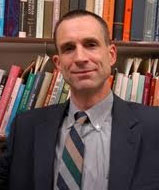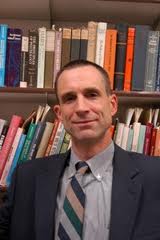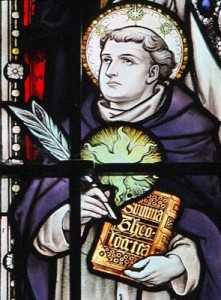st thomas aquinas
CA-4 Christian Apologetics with Dr. R. R. Reno episode 4 – St. Thomas Aquinas
Episode 4-Whether this doctrine is the same as wisdom?
Podcast: Play in new window | Download (Duration: 31:56 — 22.0MB) | Embed
Subscribe: Apple Podcasts | Spotify | Amazon Music | Android | Pandora | iHeartRadio | JioSaavn | Podchaser | Gaana | Podcast Index | Email | TuneIn | Deezer | Anghami | RSS | More
Question 1 Article 6 Whether this doctrine is the same as wisdom??
Objection 1: It seems that this doctrine is not the same as wisdom. For no doctrine which borrows its principles is worthy of the name of wisdom; seeing that the wise man directs, and is not directed (Metaph. i). But this doctrine borrows its principles. Therefore this science is not wisdom.
Objection 2: Further, it is a part of wisdom to prove the principles of other sciences. Hence it is called the chief of sciences, as is clear in Ethic. vi. But this doctrine does not prove the principles of other sciences. Therefore it is not the same as wisdom.
Objection 3: Further, this doctrine is acquired by study, whereas wisdom is acquired by God’s inspiration; so that it is numbered among the gifts of the Holy Spirit (Is. 11:2). Therefore this doctrine is not the same as wisdom.
 On the contrary, It is written (Dt. 4:6): “This is your wisdom and understanding in the sight of nations.”
On the contrary, It is written (Dt. 4:6): “This is your wisdom and understanding in the sight of nations.”
I answer that, This doctrine is wisdom above all human wisdom; not merely in any one order, but absolutely. For since it is the part of a wise man to arrange and to judge, and since lesser matters should be judged in the light of some higher principle, he is said to be wise in any one order who considers the highest principle in that order: thus in the order of building, he who plans the form of the house is called wise and architect, in opposition to the inferior laborers who trim the wood and make ready the stones: “As a wise architect, I have laid the foundation” (1 Cor. 3:10). Again, in the order of all human life, the prudent man is called wise, inasmuch as he directs his acts to a fitting end: “Wisdom is prudence to a man” (Prov. 10: 23). Therefore he who considers absolutely the highest cause of the whole universe, namely God, is most of all called wise. Hence wisdom is said to be the knowledge of divine things, as Augustine says (De Trin. xii, 14). But sacred doctrine essentially treats of God viewed as the highest cause—not only so far as He can be known through creatures just as philosophers knew Him—“That which is known of God is manifest in them” (Rm. 1:19)—but also as far as He is known to Himself alone and revealed to others. Hence sacred doctrine is especially called wisdom.
Reply to Objection 1: Sacred doctrine derives its principles not from any human knowledge, but from the divine knowledge, through which, as through the highest wisdom, all our knowledge is set in order.
Reply to Objection 2: The principles of other sciences either are evident and cannot be proved, or are proved by natural reason through some other science. But the knowledge proper to this science comes through revelation and not through natural reason. Therefore it has no concern to prove the principles of other sciences, but only to judge of them. Whatsoever is found in other sciences contrary to any truth of this science must be condemned as false: “Destroying counsels and every height that exalteth itself against the knowledge of God” (2 Cor. 10:4,5).
Reply to Objection 3: Since judgment appertains to wisdom, the twofold manner of judging produces a twofold wisdom. A man may judge in one way by inclination, as whoever has the habit of a virtue judges rightly of what concerns that virtue by his very inclination towards it. Hence it is the virtuous man, as we read, who is the measure and rule of human acts. In another way, by knowledge, just as a man learned in moral science might be able to judge rightly about virtuous acts, though he had not the virtue. The first manner of judging divine things belongs to that wisdom which is set down among the gifts of the Holy Ghost: “The spiritual man judgeth all things” (1 Cor. 2:15). And Dionysius says (Div. Nom. ii): “Hierotheus is taught not by mere learning, but by experience of divine things.” The second manner of judging belongs to this doctrine which is acquired by study, though its principles are obtained by revelation.
For an online version of St. Thomas Aquinas’ “Summa” click here
“Christian Apologetics with Dr. R. R. Reno” explores numerous facets of faith and reason in the life of the Church and the world. Grounded on the work of giants, such as St. Thomas Aquinas, St. Bonaventure, Blessed John Newman, soon-to-be Blessed John Paul II, G. K. Chesterton, Blaise Pascal and Stephen Barr, Dr. Reno helps us to open our minds to make the journey to our hearts.
R. R. Reno is the editor at First Things: A Journal of Religion, Culture, and Public Life, and Professor of Theology, currently on leave from Creighton University. His theological work has been published in many academic journals. Essays and opinion pieces on religion, public life, contemporary culture, and current events have appeared in Commentary, and the Washington Post. In Fighting the Noonday Devil Reno suggests that putting ourselves at the disposal of what is real is what trains us for true piety. His other recent books include Genesis: Brazos Theological Commentary on the Bible and Sanctified Vision: An Introduction to Early Christian Interpretation of the Bible.
CA-3 Christian Apologetics with Dr. R. R. Reno episode 3 – St. Thomas Aquinas
 Episode 3- Whether sacred doctrine (theology) is nobler than other sciences?
Episode 3- Whether sacred doctrine (theology) is nobler than other sciences?
Podcast: Play in new window | Download (Duration: 27:52 — 63.8MB) | Embed
Subscribe: Apple Podcasts | Spotify | Amazon Music | Android | Pandora | iHeartRadio | JioSaavn | Podchaser | Gaana | Podcast Index | Email | TuneIn | Deezer | Anghami | RSS | More
 Question 1 Article 5 Whether sacred doctrine is nobler than other sciences?
Question 1 Article 5 Whether sacred doctrine is nobler than other sciences?
Objection 1: It seems that sacred doctrine is not nobler than other sciences; for the nobility of a science depends on the certitude it establishes. But other sciences, the principles of which cannot be doubted, seem to be more certain than sacred doctrine; for its principles—namely, articles of faith—can be doubted. Therefore other sciences seem to be nobler.
Objection 2: Further, it is the sign of a lower science to depend upon a higher; as music depends on arithmetic. But sacred doctrine does in a sense depend upon philosophical sciences; for Jerome observes, in his Epistle to Magnus, that “the ancient doctors so enriched their books with the ideas and phrases of the philosophers, that thou knowest not what more to admire in them, their profane erudition or their scriptural learning.” Therefore sacred doctrine is inferior to other sciences.
On the contrary, Other sciences are called the handmaidens of this one: “Wisdom sent her maids to invite to the tower” (Prov. 9:3).
I answer that, Since this science is partly speculative and partly practical, it transcends all others speculative and practical. Now one speculative science is said to be nobler than another, either by reason of its greater certitude, or by reason of the higher worth of its subject-matter. In both these respects this science surpasses other speculative sciences; in point of greater certitude, because other sciences derive their certitude from the natural light of human reason, which can err; whereas this derives its certitude from the light of divine knowledge, which cannot be misled: in point of the higher worth of its subject-matter because this science treats chiefly of those things which by their sublimity transcend human reason; while other sciences consider only those things which are within reason’s grasp. Of the practical sciences, that one is nobler which is ordained to a further purpose, as political science is nobler than military science; for the good of the army is directed to the good of the State. But the purpose of this science, in so far as it is practical, is eternal bliss; to which as to an ultimate end the purposes of every practical science are directed. Hence it is clear that from every standpoint, it is nobler than other sciences.
Reply to Objection 1: It may well happen that what is in itself the more certain may seem to us the less certain on account of the weakness of our intelligence, “which is dazzled by the clearest objects of nature; as the owl is dazzled by the light of the sun” (Metaph. ii, lect. i). Hence the fact that some happen to doubt about articles of faith is not due to the uncertain nature of the truths, but to the weakness of human intelligence; yet the slenderest knowledge that may be obtained of the highest things is more desirable than the most certain knowledge obtained of lesser things, as is said in de Animalibus xi.
Reply to Objection 2: This science can in a sense depend upon the philosophical sciences, not as though it stood in need of them, but only in order to make its teaching clearer. For it accepts its principles not from other sciences, but immediately from God, by revelation. Therefore it does not depend upon other sciences as upon the higher, but makes use of them as of the lesser, and as handmaidens: even so the master sciences make use of the sciences that supply their materials, as political of military science. That it thus uses them is not due to its own defect or insufficiency, but to the defect of our intelligence, which is more easily led by what is known through natural reason (from which proceed the other sciences) to that which is above reason, such as are the teachings of this science.
For an online version of St. Thomas Aquinas’ “Summa” click here
“Christian Apologetics with Dr. R. R. Reno” explores numerous facets of faith and reason in the life of the Church and the world. Grounded on the work of giants, such as St. Thomas Aquinas, St. Bonaventure, Blessed John Newman, soon-to-be Blessed John Paul II, G. K. Chesterton, Blaise Pascal and Stephen Barr, Dr. Reno helps us to open our minds to make the journey to our hearts.
R. R. Reno is the editor at First Things: A Journal of Religion, Culture, and Public Life, and Professor of Theology, currently on leave from Creighton University. His theological work has been published in many academic journals. Essays and opinion pieces on religion, public life, contemporary culture, and current events have appeared in Commentary, and the Washington Post. In Fighting the Noonday Devil Reno suggests that putting ourselves at the disposal of what is real is what trains us for true piety. His other recent books include Genesis: Brazos Theological Commentary on the Bible and Sanctified Vision: An Introduction to Early Christian Interpretation of the Bible.
CA-2 What is the relationship between religion and science?-St. Thomas Aquinas – Christian Apologetics with Dr. R. R. Reno ep 2
 Episode 2- What is the relationship between religion and science?
Episode 2- What is the relationship between religion and science?
Podcast: Play in new window | Download (Duration: 27:58 — 25.6MB) | Embed
Subscribe: Apple Podcasts | Spotify | Amazon Music | Android | Pandora | iHeartRadio | JioSaavn | Podchaser | Gaana | Podcast Index | Email | TuneIn | Deezer | Anghami | RSS | More
 Question 1 Article 2. Whether sacred doctrine is a science.
Question 1 Article 2. Whether sacred doctrine is a science.
Objection 1: It seems that sacred doctrine is not a science. For every science proceeds from self-evident principles. But sacred doctrine proceeds from articles of faith which are not self-evident, since their truth is not admitted by all: “For all men have not faith” (2 Thess. 3:2). Therefore sacred doctrine is not a science.
Objection 2: Further, no science deals with individual facts. But this sacred science treats of individual facts, such as the deeds of Abraham, Isaac and Jacob and such like. Therefore sacred doctrine is not a science.
On the contrary, Augustine says (De Trin. xiv, 1) “to this science alone belongs that whereby saving faith is begotten, nourished, protected and strengthened.” But this can be said of no science except sacred doctrine. Therefore sacred doctrine is a science.
I answer that, Sacred doctrine is a science. We must bear in mind that there are two kinds of sciences. There are some which proceed from a principle known by the natural light of intelligence, such as arithmetic and geometry and the like. There are some which proceed from principles known by the light of a higher science: thus the science of perspective proceeds from principles established by geometry, and music from principles established by arithmetic. So it is that sacred doctrine is a science because it proceeds from principles established by the light of a higher science, namely, the science of God and the blessed. Hence, just as the musician accepts on authority the principles taught him by the mathematician, so sacred science is established on principles revealed by God.
Reply to Objection 1: The principles of any science are either in themselves self-evident, or reducible to the conclusions of a higher science; and such, as we have said, are the principles of sacred doctrine.
Reply to Objection 2: Individual facts are treated of in sacred doctrine, not because it is concerned with them principally, but they are introduced rather both as examples to be followed in our lives (as in moral sciences) and in order to establish the authority of those men through whom the divine revelation, on which this sacred scripture or doctrine is based, has come down to us.
For an online version of St. Thomas Aquinas’ “Summa” click here
“Christian Apologetics with Dr. R. R. Reno” explores numerous facets of faith and reason in the life of the Church and the world. Grounded on the work of giants, such as St. Thomas Aquinas, St. Bonaventure, Blessed John Newman, soon-to-be Blessed John Paul II, G. K. Chesterton, Blaise Pascal and Stephen Barr, Dr. Reno helps us to open our minds to make the journey to our hearts.
R. R. Reno is the editor at First Things: A Journal of Religion, Culture, and Public Life, and Professor of Theology, currently on leave from Creighton University. His theological work has been published in many academic journals. Essays and opinion pieces on religion, public life, contemporary culture, and current events have appeared in Commentary, and the Washington Post. In Fighting the Noonday Devil Reno suggests that putting ourselves at the disposal of what is real is what trains us for true piety. His other recent books include Genesis: Brazos Theological Commentary on the Bible and Sanctified Vision: An Introduction to Early Christian Interpretation of the Bible.



